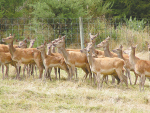NZ Deerstalkers’ Association spokesman Bill O’Leary says they a serious menace to New Zealand’s backcountry.
“We join other public groups in asking the government to tackle them now and in the foreseeable future, says O’Leary, Nelson.
“If left unchecked, they will forever change our unique high country landscape. The biggest impacts will be on our unique biodiversity, pastoral farming and soaking up our precious water resources.
Biosecurity NZ estimates 20% of New Zealand will be covered in unwanted wilding conifers within 20 years if their spread isn't stopped. Wilding conifers already cover more than 1.8 million hectares of New Zealand. Despite control efforts, they have been spreading at about 5% a year. That's about 90,000 more hectares a year.
Planted in the right place, introduced conifer trees such as pines and firs can provide timber, store carbon, improve water quality and provide shelter for stock.
However, in the wrong place, these conifers are a major threat to New Zealand's ecosystems, land and farms.
O’Leary says wilding conifer forests will also make access to the high country increasingly challenging for recreationists, including hunters.
“Recent events have also highlighted the fire risk. We have every good reason to be concerned. ”Hunters had already reported seedlings growing in remote places from the northern Ruahines to the Marlborough backcountry and the Mackenzie basin, O’Leary said.
“Individual hunters and trampers pull some up but not in a systematic or comprehensive way. The scale of the problem is immense and it has to be tackled on a large scale. The way that pines can seed and multiply very rapidly makes it a different challenge compared to possum control programmes.
“Communities and government must consider this a priority for future funding and control. Proven control methods of including spray and helicopter wanding and the work of ground-based personnel are having the desired effect. Costs of these operations are significant, but hunters believe there is no alternative; we need to be in for the long haul.”



















